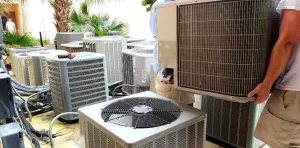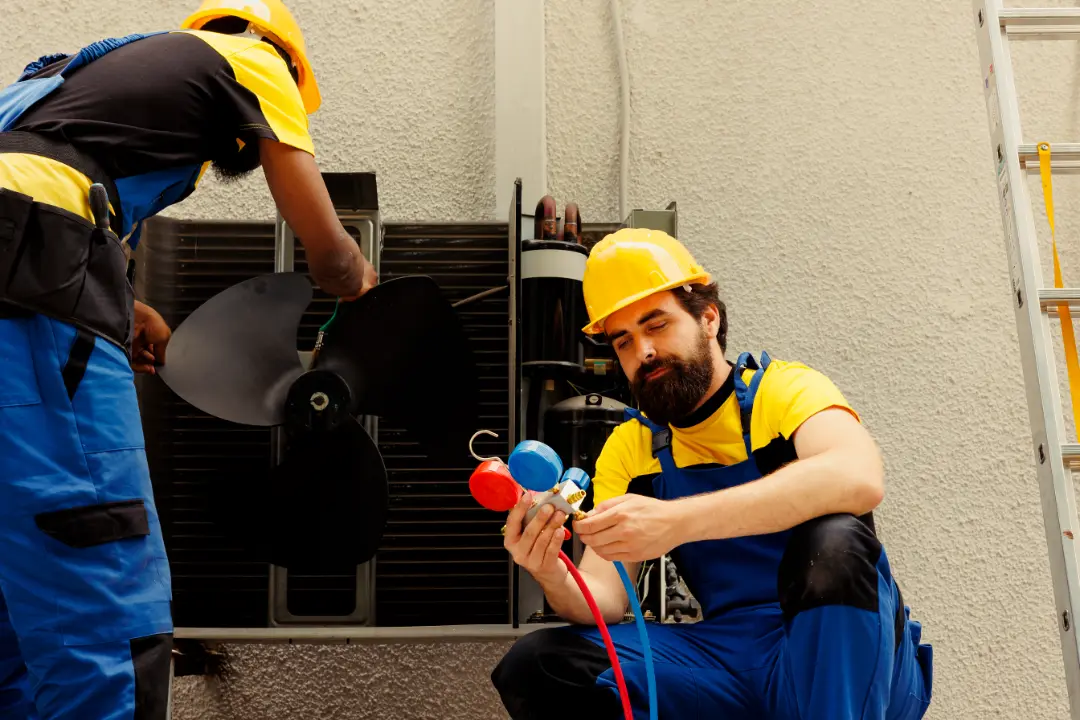Figuring out what size air conditioner you need is essential for comfort and efficiency.
This article will guide you through calculating the right BTUs, understanding different air conditioner types, and ensuring you pick the perfect unit for your space.
Key Takeaways
- Choosing the right BTU rating is crucial for efficient cooling, balancing room size with additional factors like occupancy and insulation.
- Larger air conditioning units can cause uneven cooling and higher energy bills, emphasising the need to avoid oversizing.
- SmartWay Air Conditioning is the leading company for air conditioning installation in Bondi, ensuring expert craftsmanship and long-lasting results.
- Energy Efficiency Ratio (EER) is essential for selecting a cost-effective air conditioner, as higher EER ratings indicate better long-term savings.
Understanding BTUs and Cooling Capacity
BTU, short for British Thermal Unit, is a common term in air conditioning. It measures cooling capacity, with one BTU representing the heat required to raise one pound of water by one degree Fahrenheit. Knowing british thermal units is essential as it affects how well an air conditioner can cool a room.
The higher the BTU rating, the more powerful an air conditioner will be. A unit with a high BTU rating has a greater cooling capacity, meaning it can remove more heat from your room in a given time. For example, a 12,000 BTU air conditioner can remove 12,000 BTUs of heat from a room in one hour, making it a significant cooling powerhouse.
However, it’s not just about choosing the most powerful air conditioner. The right BTU rating ensures that the unit can cool the room efficiently without overworking itself or consuming excessive energy. Moreover, higher BTUs also mean more energy consumption, which can impact your energy bills if not matched to the proper room size and requirements.

How to Calculate the Required BTUs for Your Room
To calculate the required BTUs for your room, begin with its size. Generally, multiply the room’s square footage by 20 to estimate the needed BTUs. For example, an 800 sq/ft apartment would need about 16,000 BTUs for adequate cooling. This formula offers a baseline for choosing the right air conditioning unit.
A 600 sq/ft room would need around 12,000 BTUs for effective cooling. Likewise, a 36 sqm (approx. 388 sq/ft) room requires about 17,000 BTUs to stay comfortable. This simple method helps determine the BTUs needed for efficient room cooling.
Other factors, like the number of occupants and heat-generating appliances, can increase the heat load, requiring a higher BTU rating. Rooms filled with people or electronic devices need more cooling power to stay comfortable. Considering these variables ensures your air conditioner has the proper cooling capacity.
Why Bigger AC Size Isn’t Always Better
Choosing a larger unit with a higher BTU rating might seem appealing, but bigger isn’t always better. An oversized air conditioner can cause uneven cooling, leaving some areas too cold and others warm and humid, which reduces the unit’s overall effectiveness and comfort.
Also, an oversized unit tends to short cycle, frequently turning on and off. This constant cycling can prematurely wear out the system and lead to higher energy bills due to increased energy consumption during start-ups and shutdowns.
Additionally, an overpowered air conditioner can cause rapid temperature fluctuations, creating an inconsistent and uncomfortable environment with cool air and hot air. Poor moisture control from an oversized unit may also lead to mould growth and degraded indoor air quality. Nevertheless, a unit slightly larger than needed can improve efficiency and prevent system strain.
Therefore, selecting the right size air conditioning unit is crucial for maintaining comfort and efficiency.
Energy Efficiency and EER Ratings
Energy Efficiency Ratio (EER) is vital when selecting an air conditioner. EER measures efficiency by dividing the cooling capacity in BTUs by power input in watts. An air conditioning unit with a higher EER rating signifies a more efficient unit capable of cooling the room while using less energy.
Units with higher EER ratings usually have lower operational costs over time. Despite a higher initial investment, energy bill savings can offset upfront costs.
An energy-efficient air conditioner reduces both your bills and environmental impact. Features like programmable thermostats and air filtration systems can further boost efficiency and comfort. Thus, considering the EER rating and additional features is crucial when shopping for an air conditioner.
Factors Beyond Room Size
Although room size is key in determining BTUs, other factors also impact cooling capacity. For instance, rooms with high sun exposure through windows may need up to a 10% increase in BTUs to account for added heat, ensuring effective cooling.
The type of insulation and quality also play a vital role. Better insulation reduces cooling demands, allowing for a smaller, more energy-efficient unit. Conversely, poorly insulated rooms may need a higher BTU rating to stay comfortable.
Ceiling height also matters; taller ceilings mean more air volume to cool, requiring a higher BTU rating. Heat-generating appliances and environmental conditions like summer temperatures and humidity also impact cooling capacity. Considering these factors ensures effective cooling.
Different Types of Air Conditioning Units
Understanding the different types of air conditioners—portable, split system, and wall-mounted units—is crucial for making the right choice. Each type offers unique advantages and limitations.
The following sections explore the specifics of each type to aid your decision-making.

Portable Air Conditioners
Portable air conditioners are favored for versatility and easy setup. They require no professional installation, ideal for renters and frequent movers. These units are cost-effective and efficiently cool medium rooms but may struggle with larger spaces due to lower cooling capacity.
Noise level is a consideration with portable air conditioners; they tend to be louder than wall split units, which might concern some users. Additionally, these units need to vent warm air outside through a window or door, making proper positioning essential for efficient venting and cooling performance.
Split System Air Conditioners
Split system air conditioners offer high efficiency and significant cooling power, which is ideal for larger areas. A wall split system includes an indoor wall unit and an outdoor compressor unit, providing some of the highest cooling capacities for effective room or area cooling.
However, split systems are not portable and require fixed installation, which might mean higher initial costs. Professional installation is essential for safety and maximum satisfaction.
Despite the costs, their efficiency and cooling power make them a worthwhile investment.
Wall-Mounted Air Conditioners
Wall-mounted air conditioners feature a sleek design that saves floor space and reduces trip hazards, ideal for many rooms. These units suit smaller areas like bedrooms or dens well, but they are more expensive to purchase and install.
Installation of wall-mounted units should also be done by a professional air conditioner installation company. They are easy to use, making them a convenient option for saving space while cooling effectively.
Choosing the Right Air Conditioner for Your Home
When you shop for air conditioners, selecting the right one for your home requires considering factors beyond room size. Professional assessments are the most reliable choice as they will help you determine the proper unit size, factoring in all determining factors, including insulation, ceiling height, and room layout.
Choosing the right size unit maximises cooling efficiency and minimises energy consumption.
Balancing your needs and budget is also crucial when selecting an air conditioning unit. Factors like space size, noise preferences, and specific features help guide you to the right system. An informed choice ensures comfort and efficiency during the hot summer months.

Choose SmartWay for Expert Air Conditioning Installation in Bondi | Get Quality, Precision & Comfort
When it comes to professional air conditioner installation in Bondi, SmartWay Air Conditioning stands out as the go-to expert for seamless, efficient, and long-lasting solutions.
With over three decades of excellent service, our team specialises in installing all types of air conditioning systems, from split systems to ducted units, ensuring optimal performance and energy efficiency.
Whether you are upgrading an existing unit or installing a brand-new system, our expertise ensures a smooth, hassle-free process that prioritises comfort, durability, and cost-effectiveness.
Our certified technicians are known for their professionalism, punctuality, and attention to detail, ensuring every installation is done right the first time. From initial consultation to post-installation support, we are committed to delivering a five-star experience that sets us apart from the competition. Choose SmartWay today for expert air conditioning solutions in Bondi.
Maintenance and Safety Considerations
Regular maintenance ensures optimal air conditioning performance. Simple tasks like clearing debris around the outdoor unit, checking for clogged condensate drains, and scheduling annual professional tune-ups can keep your air conditioner performing at its best for years. Maintenance enhances performance, prolongs lifespan, and boosts energy efficiency.
The indoor unit can accumulate dirt and mold over time, reducing effectiveness. Prompt maintenance and addressing issues prevent breakdowns and costly repairs. Keeping your air conditioner in top condition ensures better health and safety and consistent, efficient cooling performance.
Frequently Asked Questions
What is a BTU, and why is it important for air conditioners?
A BTU, or British Thermal Unit, is a crucial measure of an air conditioner’s cooling capacity, directly influencing its efficiency in lowering indoor temperatures. Understanding BTUs helps ensure you select the right air conditioner for your specific space needs.
How do I calculate the required BTUs for my room?
To calculate the required BTUs for your room, multiply the square footage by 20 and then adjust for factors such as sun exposure, number of occupants, and heat-generating appliances. This approach ensures a more accurate estimate for your cooling needs.
Why shouldn’t I choose the most powerful air conditioner available?
Choosing the most powerful air con unit
can lead to uneven cooling, increased energy costs, and quicker wear and tear. It’s essential to select a unit that matches your space’s requirements for optimal efficiency and comfort.
What is the Energy Efficiency Ratio (EER)?
The Energy Efficiency Ratio (EER) gauges an air conditioning unit’s efficiency by dividing its cooling capacity in BTUs by its power input in watts; a higher EER signifies better efficiency.
How often should I maintain my air conditioning unit?
An air conditioner requires annual maintenance and regular debris clearing for optimal performance and longevity. This will also ensure energy efficiency.
Conclusion
Selecting the right size air conditioner involves understanding BTUs and their role in cooling capacity, calculating the required BTUs for your room, and considering factors beyond room size. It’s essential to choose an appropriately sized unit to ensure comfort, efficiency, and longevity.
By considering energy efficiency, maintenance, and the various types of air conditioning units available, you can make an informed decision that meets your needs and budget. Embrace the comfort of a well-cooled home and enjoy the benefits of a wisely chosen air conditioning system.



